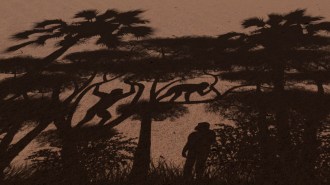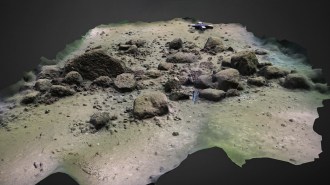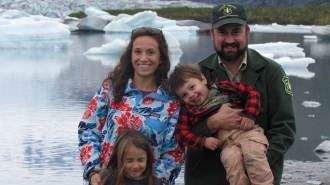All Stories
-
 Animals
AnimalsDoes this drone image show a newborn white shark? Experts aren’t sure
If a claim of the first-ever sighting of a newborn white shark holds, it could help solve a mystery of where adult white sharks give birth.
-
 Anthropology
Anthropology50 years ago, evidence showed that an extinct human ancestor walked upright
Fossil finds have since pushed back the ability of hominids to walk on two legs by millions of years.
-
 Archaeology
ArchaeologyThis Stone Age wall may have led Eurasian reindeer to their doom
Hunter-gatherers living 10,000 years ago in what is now Germany probably used the wall to trap reindeer in a nearby lake.
By Anna Gibbs -
 Animals
AnimalsMigratory fish species are in drastic decline, a new UN report details
The most comprehensive tally of how migrating animals are faring looks at more than 1,000 land and aquatic species and aims to find ways to protect them.
-
 Artificial Intelligence
Artificial IntelligenceHow do babies learn words? An AI experiment may hold clues
Using relatively little data, audio and video taken from a baby’s perspective, an AI program learned the names of objects the baby encountered.
-
 Neuroscience
NeuroscienceA new device let a man sense temperature with his prosthetic hand
A device that can be integrated into prosthetic hands capitalizes on phantom sensations to enable users to sense hot and cold.
By Simon Makin -
 Space
SpaceHow to build an internet on Mars
Future Red Planet inhabitants will need new ways to connect, including improved relay networks and an offshoot internet.
By Payal Dhar -
 Animals
AnimalsHere’s how many shark bites there were in 2023
The chance of being bitten by a shark is still incredibly slim, according to a new report from the Florida Museum of Natural History.
-
 Space
SpaceHow ‘Our Moon’ shaped life on Earth and human history
Science News reviews Rebecca Boyle’s new wide-ranging book, which tells the story of the moon and its relationship with the inhabitants of Earth.
By Shi En Kim -
 Animals
AnimalsThe first known scorpion to live with ants carries mini hitchhikers
Small arachnids hitch a ride on the scorpion, possibly to get inside food-rich ant nests.
By Jake Buehler -
 Health & Medicine
Health & MedicineA 25-year-effort uncovers clues to unexplained deaths in children
When Laura Gould’s daughter died in 1997, there was almost no research in unexpected deaths in children older than one. Gould helped change that.
-
 Plants
PlantsHere’s why blueberries are blue
Nanostructures in a blueberry’s waxy coating make it look blue, despite having dark red pigments — and no blue ones — in its skin, a new study reports.